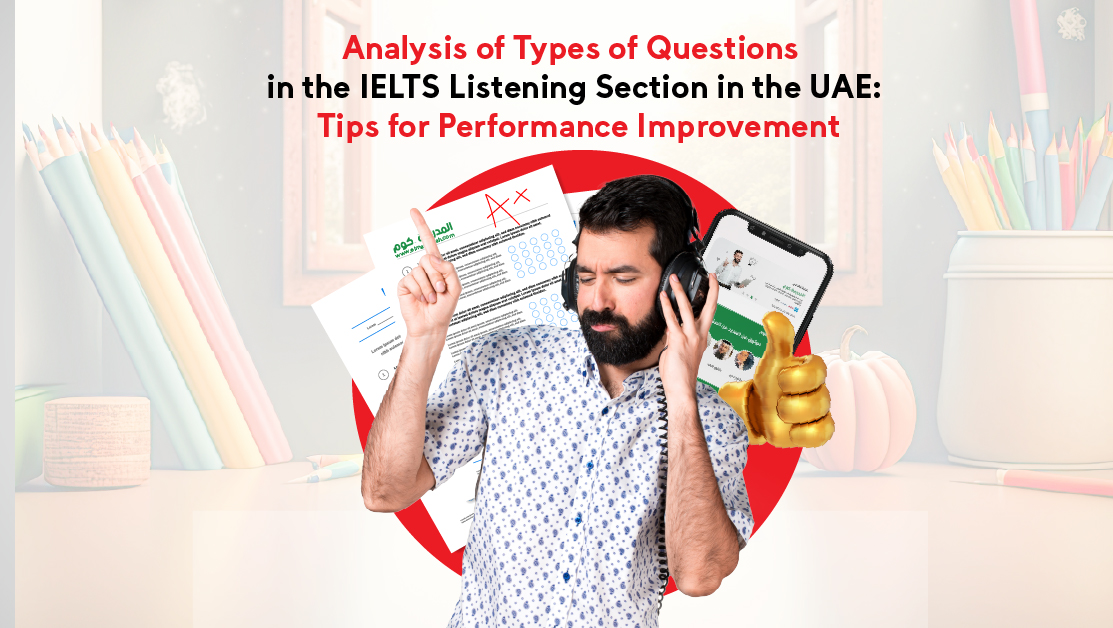
The International English Language Testing System (IELTS) is a critical evaluation for those aiming to study, work, or immigrate to English-speaking countries. In the United Arab Emirates (UAE), where diverse populations pursue global opportunities, excelling in the IELTS Listening Section is crucial. This essay explores effective strategies tailored to IELTS Listening Section in the UAE the unique challenges faced by test-takers in the UAE, shedding light on mastering the art of Listening Comprehension in IELTS.
Understanding the Structure of Questions in the IELTS Listening Section in the UAE
Before delving into strategies, it’s essential to comprehend the various question types encountered in the IELTS Listening Section in the UAE . Questions in the IELTS Listening Section in the UAE are diverse, ranging from multiple-choice to matching tasks. Familiarizing oneself with these question types lays the foundation for success.
Multiple-Choice Questions: Navigating Options with Precision
Multiple-choice questions embedded within the IELTS Listening Section pose a unique set of challenges, intricately woven to demand a heightened auditory acuity and swift decision-making prowess. It is in this intricate tapestry of assessment that test-takers in the UAE find themselves navigating through a labyrinth of options. Within this dynamic context, it becomes imperative for them to hone the art of discernment by meticulously identifying keywords and subtle nuances embedded within the answer choices. The process is akin to a delicate dance, where precision is paramount. This precision is not only about selecting the correct answer but also about skillfully eliminating distractors. For those undertaking the IELTS journey in the UAE, the focus should transcend the surface level of these questions, delving deep into the layers of meaning embedded within each option. By doing so, test-takers can effectively narrow down their choices with a discerning eye, ensuring that their responses mirror a mastery of both the content and the strategic approach.
Matching Tasks: Aligning Information with Precision
Matching tasks, a formidable component of the IELTS Listening Section, require a nuanced skill set that goes beyond the mere act of connecting dots. In the multifaceted context of the UAE, where English is not the native language for a significant portion of test-takers, the challenge becomes twofold. Beyond the language barrier, mastering the art of swiftly aligning information presented in the audio with the options provided becomes an invaluable skill set. This skill is not only a testament to one’s linguistic proficiency but also a demonstration of cognitive agility. Practice, therefore, becomes the cornerstone upon which success in this task rests. Engaging in targeted exercises that mirror the complexities of matching tasks allows test-takers to refine their ability to discern connections amidst a myriad of information. Whether it be aligning names with descriptions or matching places with corresponding events, the journey toward precision demands consistent practice and a strategic mindset. For test-takers in the UAE, it is a journey that transcends linguistic boundaries, requiring a harmonious blend of language proficiency and cognitive dexterity.
Sentence Completion: Grasping Contextual Clues
The realm of sentence completion questions within the IELTS Listening Section transcends the mere regurgitation of information. It is a domain where test-takers are not only evaluated on their capacity to comprehend specific details but are also scrutinized for their ability to grasp contextual nuances. In the diverse linguistic landscape of the UAE, these questions present a challenge that extends beyond the literal interpretation of words. The intricacies of sentence completion tasks in the IELTS Listening Section in the UAE may necessitate test-takers to fill in blanks based on a broader thematic understanding rather than isolated pieces of information. In navigating this challenging terrain, a strategic approach takes center stage. This involves not merely reacting to the information presented but proactively predicting potential answers before they unfold in the audio. The process is akin to deciphering a puzzle, where each piece contributes to the larger picture of contextual comprehension. Thus, for those preparing for the IELTS Listening Section in the UAE, sentence completion questions become an arena for honing predictive skills, unraveling the tapestry of meaning woven within the audio, and showcasing a level of linguistic finesse that transcends the ordinary.
Listening Comprehension in IELTS: A Holistic Approach
Listening Comprehension in IELTS extends beyond mere question-solving. It involves grasping the overall context, understanding accents, and discerning subtle nuances in pronunciation. In the UAE, where English is spoken with diverse accents, acclimatizing oneself to these variations is crucial.
Diverse Accents in the UAE: The Challenge and Opportunity
The multicultural environment of the UAE presents both a challenge and an opportunity for IELTS Listening Section in the UAE test-takers. The linguistic landscape is rich with a myriad of accents, ranging from British English to American English and various regional variations. This diversity necessitates a comprehensive approach to Listening Practice for IELTS Listening Section in the UAE . To ensure adaptability during the test, candidates should expose themselves to a wide range of accents through various mediums such as podcasts, news broadcasts, and online resources. Engaging with these diverse accents not only fortifies listening skills but also prepares test-takers for the varied linguistic encounters they might face during the examination.
Building Vocabulary for IELTS Listening: Beyond the Basics
A robust vocabulary serves as a cornerstone for success in the IELTS Listening Test. Beyond the rudimentary task of understanding questions, candidates in the IELTS Listening Section in the UAE often encounter items that demand a nuanced understanding of words and phrases. Consequently, expanding one’s vocabulary becomes a strategic imperative. This can be achieved through a multifaceted approach, including extensive reading, active engagement with English media, and a deliberate effort to learn new words. By incorporating these practices into their routine, test-takers not only enhance their language proficiency but also refine their ability to decipher intricate lexical nuances in the audio components of the test.
Listening Practice for IELTS: The Gateway to Confidence
Effective listening practice is the linchpin of success in the IELTS Listening Section. Test-takers in the UAE must integrate targeted exercises into their preparation routine to build confidence and proficiency.
Simulated Test Environments: Replicating Exam Conditions
Creating a simulated test environment emerges as a powerful technique within the realm of effective listening practice. The rationale behind this strategy is to mimic the IELTS Listening Section conditions as closely as possible, leaving no stone unturned. By incorporating elements such as time constraints and the immersive atmosphere of the actual exam, this approach serves a dual purpose. Firstly, it enhances crucial time management skills, a prerequisite for success in any standardized test. Secondly, and perhaps more importantly, it acquaints test-takers in the UAE with the palpable pressure that characterizes the real examination setting. This experiential familiarity proves instrumental in fortifying mental resilience and composure during the actual test, contributing significantly to overall performance.
Regular Practice Sessions: Consistency is Key
In the pursuit of mastering Listening Practice for IELTS Listening Section in the UAE, consistency emerges as a paramount principle. Test-takers in the UAE are advised to dedicate specific time slots on a regular basis to hone their listening skills. The significance of consistency lies not merely in the frequency of practice but also in the development of sustained focus throughout the entirety of the test. This deliberate and consistent effort facilitates the cultivation of an innate familiarity with the nuances of the Listening Section, empowering candidates to approach the test with confidence and precision.
Utilizing IELTS Preparation Materials: A Treasure Trove of Resources
Official IELTS preparation materials stand as invaluable assets in the arsenal of any aspiring test-taker. This treasure trove includes an array of resources such as sample listening tests, practice questions, and answer keys. For test-takers in the UAE, leveraging these resources becomes an indispensable strategy in fine-tuning their listening skills and gaining profound insights into the intricacies of the test format. The diverse range of materials not only exposes candidates to various question types but also provides a nuanced understanding of the expectations set by the IELTS examiners. This informed approach enables test-takers to tailor their preparation according to the specific demands of the test, thereby maximizing the efficacy of their efforts.
Strategies for Tackling Difficulties: Turning Challenges into Triumphs
Challenges are inevitable in any test, and the IELTS Listening Section is no exception. Understanding common stumbling blocks and implementing targeted strategies is essential for overcoming difficulties.
Fast Speech and Rapid Information: Enhancing Speed and Accuracy
One prevalent difficulty encountered in the IELTS Listening Section revolves around the brisk pace of speech and the rapid delivery of information. To effectively address this challenge, test-takers can proactively concentrate on refining their listening speed through consistent practice with materials featuring swift-paced conversations. Incorporating resources like TED Talks or debates into their routine allows for exposure to the kind of language speed commonly encountered in the actual test.
Distractions in the Audio: Sharpening Focus and Concentration
The IELTS Listening Test strategically introduces distractions within the audio to assess the candidate’s ability to maintain concentration. Within training courses for IELTS, there may be specific exercises curated to elevate focus and concentration levels. Additionally, incorporating mindfulness techniques into the preparation routine can further contribute to honing the skill of staying attentive amidst potential distractions, fostering resilience during the actual test.
Managing Anxiety: Cultivating a Calm Mindset
Test anxiety, a ubiquitous challenge, has the potential to impede optimal performance. Integrating strategies for managing anxiety as an integral component of test preparation is imperative. Techniques such as deep breathing exercises, positive visualization, and mindfulness practices are invaluable tools in cultivating a calm and composed mindset during the test. By actively engaging with these anxiety-alleviating methods, test-takers in the UAE can enhance their emotional resilience, ensuring that nervousness does not overshadow their ability to perform at their best on test day.
Training Courses for IELTS: Maximizing Potential
Enrolling in training courses for IELTS provides structured guidance and targeted support. In the UAE, where individuals may have varying levels of exposure to English, these courses play a crucial role in refining skills and boosting confidence.
Tailored Training for UAE Test-Takers: Addressing Unique Needs
Tailoring training courses for IELTS Listening Section in the UAE to the needs of test-takers in the UAE involves a meticulous approach. These courses should be designed with a keen understanding of the specific requirements of the local demographic. This includes not only providing targeted practice on accents commonly encountered in the region but also addressing linguistic challenges unique to the UAE context. Recognizing and catering to the diverse linguistic backgrounds of test-takers contribute significantly to the effectiveness of these courses.
Interactive Learning: Fostering Engagement and Participation
In the realm of effective training courses for IELTS, the emphasis extends beyond traditional learning methodologies. Interactive elements are seamlessly woven into the fabric of these courses to engage test-takers actively. Group discussions, collaborative exercises, and real-time feedback create a dynamic learning environment that transcends the confines of conventional classroom settings. Such interactive elements serve a dual purpose, making the learning experience not only enjoyable but also enhancing comprehension and long-term retention of crucial skills.
Mock Tests and Performance Evaluation: Fine-Tuning Strategies
Mock tests stand as integral components within the framework of IELTS Listening Section in the UAE training courses, offering a valuable opportunity for practical application of learned strategies. In a simulated environment, test-takers can navigate the challenges they may encounter during the actual exam, providing a real-world context for refining their skills. Beyond this, regular mock tests serve as a mechanism for performance evaluation, offering insights into specific areas that require improvement. This nuanced understanding guides focused efforts in the final stages of preparation, allowing test-takers to fine-tune their strategies for optimal performance on test day.
Mastering the IELTS Listening Section in the UAE demands a multifaceted approach. From understanding the nuances of Questions in the IELTS Listening Section in the UAE to cultivating listening comprehension skills, practicing consistently, and seeking structured training courses, each step contributes to the journey of excellence. Questions in the IELTS Listening Section in the UAE echoes the diverse challenges test-takers face, while “Listening Comprehension in IELTS” and “Listening Practice for IELTS” underscore the core components of success. As aspiring candidates embark on this journey, they should remember that excellence is not merely a destination but a continuous process of growth and refinement.















